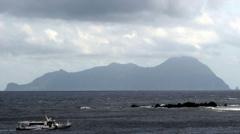Residents of the Tokara islands, located in southern Japan, are grappling with anxiety and sleepless nights as more than 900 earthquakes have struck the region in just two weeks. The seismic turmoil began on June 21, culminating in a magnitude 5.5 quake on Wednesday. While authorities report no significant damage or tsunami threats, they are urging residents to be prepared for potential evacuations.
"It's terrifying to even think about falling asleep," expressed one resident to regional broadcaster MBC. "It feels like the ground is constantly moving." Historically, the Tokara area has experienced clusters of earthquakes, but the intensity and frequency of the current tremors are particularly alarming, according to local media.
Japan's geographical setting on the Pacific Ring of Fire makes it one of the most seismically active nations, with approximately 1,500 earthquakes occurring annually. The Tokara islands, home to about 700 residents spread across seven of twelve islands, face unique challenges, as some islands lack hospitals, with the nearest being a six-hour ferry ride away in Kagoshima.
Chizuko Arikawa, a local resident and cattle farmer, described eerie pre-quake sensations: "There's a strange roar from the ocean before the quakes hit, especially at night. It's unsettling." Her neighbor Isamu Sakamoto, head of the local residents' association, noted that the unrelenting quakes have left residents feeling as though the ground is shaking even when it is still.
In Toshima village, officials reported that residents have been deprived of sleep, and they have requested the media to limit inquiries, as locals are already anxious. Some guesthouses have halted tourist bookings, preparing to act as shelters for residents if necessary.
The recurring tremors come alongside rising fears of a potentially catastrophic earthquake, fueled by a 1999 comic book that has sparked speculation about an impending disaster set for July 5. This has led to an increase in trip cancellations as many tourists are spooked by the prospect of a 'big one' occurring.
Despite the fact that most earthquakes in Japan are mild, the memory of devastating events, like the one in 2011 that left over 18,000 people dead after a massive tsunami, remains fresh. To bolster public safety ahead of future disasters, the government has announced new preparedness measures including embankment construction and evacuation building initiatives, cautioning that much more remains to be done to ensure safety in case of such a calamity.
"It's terrifying to even think about falling asleep," expressed one resident to regional broadcaster MBC. "It feels like the ground is constantly moving." Historically, the Tokara area has experienced clusters of earthquakes, but the intensity and frequency of the current tremors are particularly alarming, according to local media.
Japan's geographical setting on the Pacific Ring of Fire makes it one of the most seismically active nations, with approximately 1,500 earthquakes occurring annually. The Tokara islands, home to about 700 residents spread across seven of twelve islands, face unique challenges, as some islands lack hospitals, with the nearest being a six-hour ferry ride away in Kagoshima.
Chizuko Arikawa, a local resident and cattle farmer, described eerie pre-quake sensations: "There's a strange roar from the ocean before the quakes hit, especially at night. It's unsettling." Her neighbor Isamu Sakamoto, head of the local residents' association, noted that the unrelenting quakes have left residents feeling as though the ground is shaking even when it is still.
In Toshima village, officials reported that residents have been deprived of sleep, and they have requested the media to limit inquiries, as locals are already anxious. Some guesthouses have halted tourist bookings, preparing to act as shelters for residents if necessary.
The recurring tremors come alongside rising fears of a potentially catastrophic earthquake, fueled by a 1999 comic book that has sparked speculation about an impending disaster set for July 5. This has led to an increase in trip cancellations as many tourists are spooked by the prospect of a 'big one' occurring.
Despite the fact that most earthquakes in Japan are mild, the memory of devastating events, like the one in 2011 that left over 18,000 people dead after a massive tsunami, remains fresh. To bolster public safety ahead of future disasters, the government has announced new preparedness measures including embankment construction and evacuation building initiatives, cautioning that much more remains to be done to ensure safety in case of such a calamity.




















